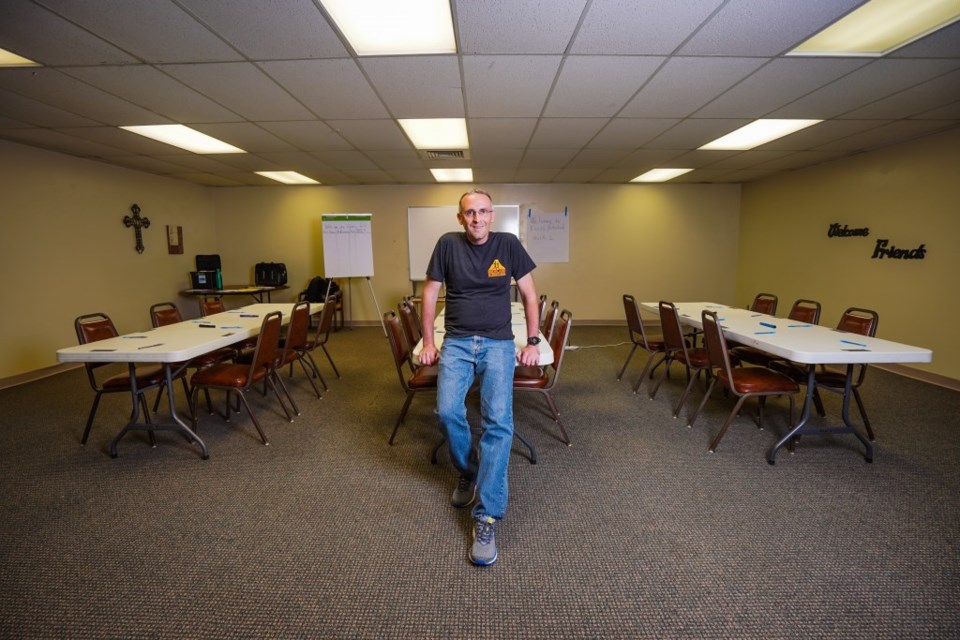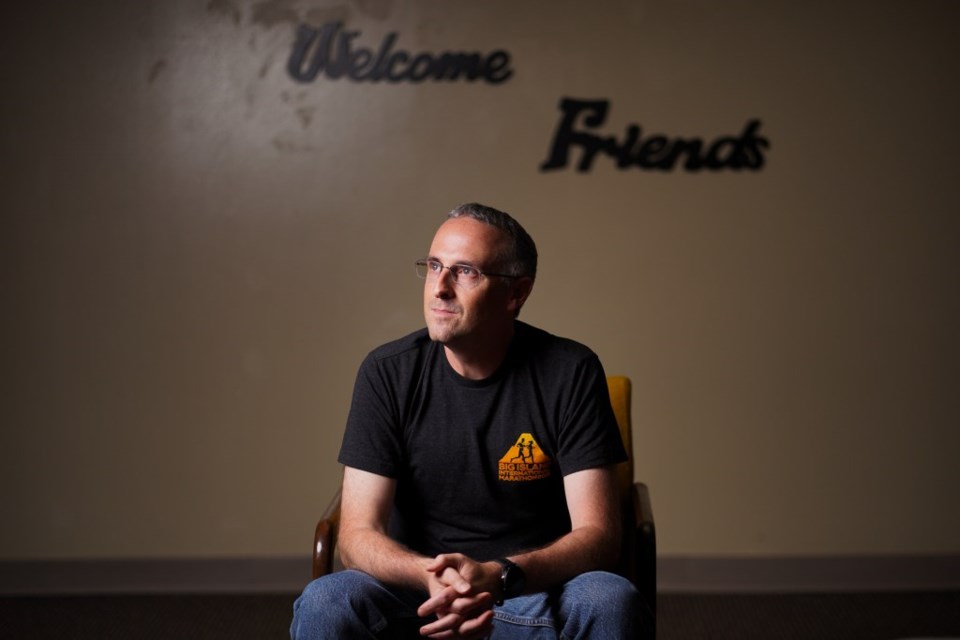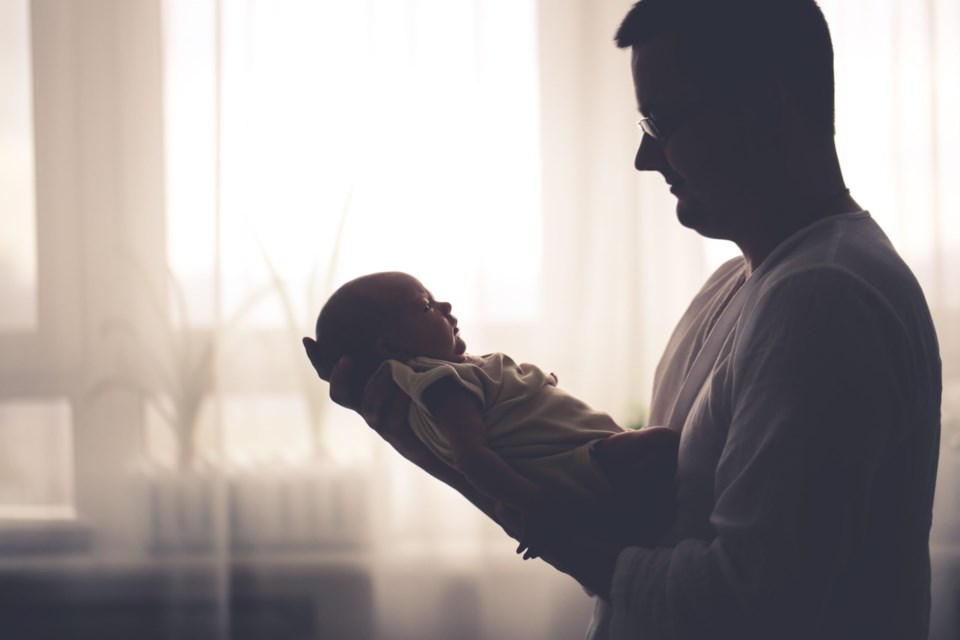*Some names have been changed to protect the privacy of those involved
Kelly Hayley stands at the front of a classroom of 15 men every Tuesday night and draws a circle on the whiteboard.
“Tell me the things in your life that are not in your control,” he says. The men shout out answers ranging from traffic to the behavior of others. Kelly draws a smaller circle. “Now tell me the things you can control.” This circle is filled with their own actions and attitudes.

At the beginning of the Focus Fatherhood course, most men sit with their arms crossed and stare forward in silence—they aren’t very happy to be there. They were told to attend by Child Protective Services as part of the personalized Safety Plan created to address the issues that put them in this situation in the first place, like drug and alcohol abuse, domestic violence, or anger management. While the most common referrals are drug related, some are just the result of an unfortunate circumstance; one father was required to take the course because his child had run away and crossed an interstate while his dad was sleeping. Another man ended up in the Focus Fatherhood class because he and his wife had a verbal altercation in front of their children an the neighbors called the police who deemed the environment unsafe.
Focus Fatherhood is a 10-week curriculum held by NewDay Services, a nonprofit organization that started more than 20 years ago in Fort Worth and has now spread throughout the DFW metroplex. NewDay gives parents the tools they need to be successful. The focus is always the wellbeing of their children.
In 2018, there were more than 3,000 CPS investigations for abuse and neglect in Collin County, and about half of those were confirmed. As a result, more than 260 children were removed from their homes and placed in the custody of extended family or foster care last year—an increase of nearly 30% from 2008 statistics.
Focus Fatherhood simply teaches men how to be better fathers. The men come from different backgrounds but are all in the same situation. Some drive up in luxury cars and others in 18-wheeler cabs; some wear custom, perfectly tailored suits while others don old t-shirts and work boots. Many of them grew up with absent fathers. Some didn’t ever experience the basic benefits of a stable family life; when Kelly asks the men how many of them had family traditions or vacations, almost no one raises their hand.
Read more: University of Texas students embark on longest charity bike ride in the world
Kelly knows what that’s like. His biological father was a zookeeper who took care of primates at the Dallas Zoo, and his family was so poor that they actually lived on zoo grounds. His parents got a divorce when he was four years old. He remembers his father showing up drunk for a visitation day and being yanked between his parents on the front yard like a human rope in a game of tug-of-war. When a judge ruled that he had to be sober in order to care for his child, his dad chose booze.
Kelly’s mother later remarried a good man who adopted Kelly when he was 18 years old, but he will never forget the pain of knowing that his birth father chose alcohol over him. When he heard about the Focus Fatherhood program, he thought it would be a way to turn the hurt from his past into something positive. He began teaching the class in Collin County in January 2015 and is now teaching his 20th course—that’s roughly 270 dads and more than 500 children that he has impacted through this program.
Teaching Focus Fatherhood isn’t Kelly’s full-time job—he’s actually an accountant—but he’s paid a small stipend to teach the class for two hours every Tuesday night, and to call each guy in the class once a week to check in. He knows the names and the ages of all of their kids. Not a father himself, Kelly approaches the course from the perspective of a child who grew up without a father, and sheds light on the lifelong effect of that absence.
“You can’t give what you weren’t given,” Kelly explains. “We give these guys guidance because they most likely never got it from their own fathers.”
Kelly faces each class with excitement and energy. After 20 courses, he’s still in awe of the drastic positive changes he sees in the men week after week, and what it means for not only the men who take it, but for their children.

The men are required by the State of Texas to attend eight of the ten classes in order to get credit with CPS and in turn keep custody of their children, but they are encouraged to attend all 10 classes. During the first five weeks, the class focuses on navigating the legal system, co-parenting and parent-child relationships. Kelly urges the men to talk about the father figure, or lack thereof, in their lives, and about what put them in this situation in the first place. They also go over concepts like the circle of control, sorting what they have the power to change and what they don’t. The last five weeks hone in on more complicated topics, like how to become a better father—a father who raises children to be healthy and responsible adults.
The final class is always a potluck, a graduation of sorts. It’s an accomplishment to see the course through to the very end. Their final task is to write a “last words” letter to their child—what would they say to them if it were the last time they ever spoke?
Read more: Affordable housing in Plano is a million dollar question
One of the benefits of the course is the camaraderie it creates for the men who take it. They aren’t alone and they’re working toward a common goal, holding each other accountable the entire way. Of the men who complete the Focus Fatherhood program, 86% retain or regain custody of their children.
John* began Focus Fatherhood in January 2018 after being separated from his two young daughters. He’s a client services representative for a Collin County tech company. Unlike many of the men in class, he grew up in a stable home with loving parents. He’s a generally optimistic person and one of the few who didn’t initially dread the class.
Week five stood out for John the most. Kelly spends it on the four characteristics that should define every a man: servant, leader, companion and warrior.
John now volunteers for the program. Since March 2018, he has attended each class, assisted with the paperwork that goes along with the course, and helped facilitate discussions. He also provides valuable perspective—he’s been there before. At the beginning of each course, John tells the new class his story, what he got out of the class, and encourages them to take it seriously so they, too, can truly benefit from it. Most people in his situation might wish they had never been in it, but John doesn’t. It turned his life around.
“It broke me down to where I really had to depend on Christ,” John says. “It brought be closer to my wife. It made me appreciate time with my daughters. It changed my perspective on life completely.”




